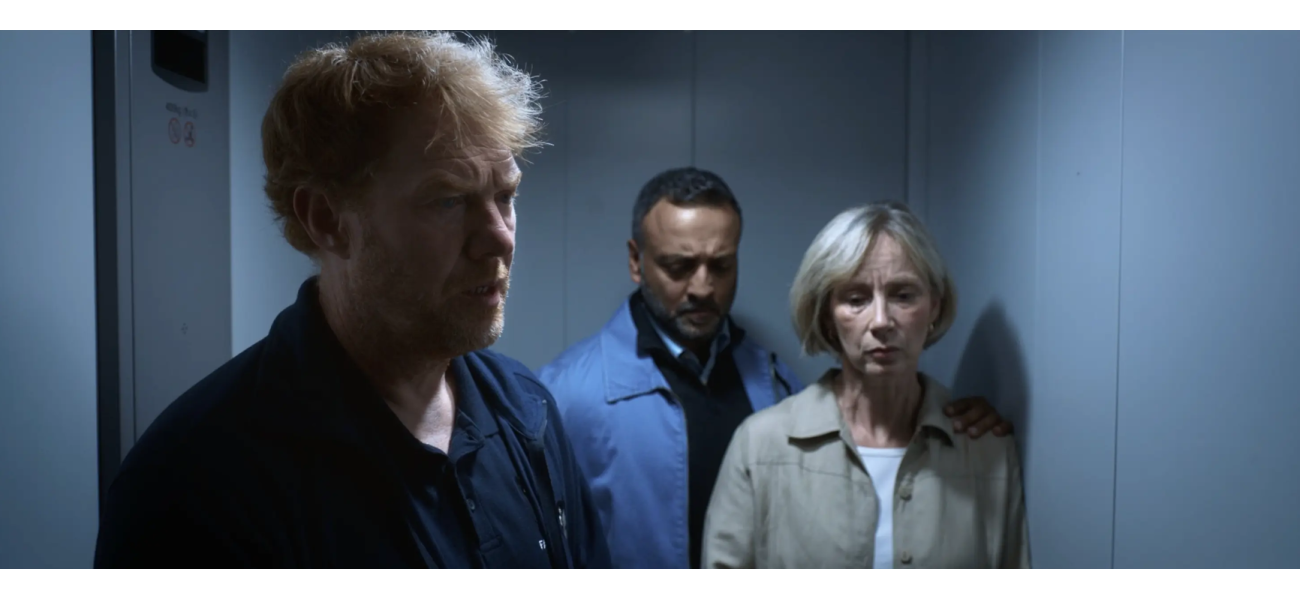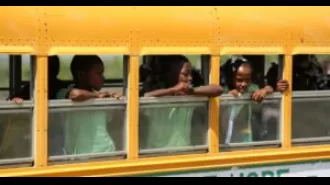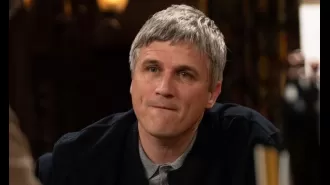New movie highlights the issue of student suicide and the devastating impact it has on communities.
The film's purpose is to initiate a discussion.
November 15th 2024.

The new film Contact Hours has been hailed as a powerful and realistic depiction of the aftermath of a student suicide. It sheds light on the often overlooked role of university caretakers and the devastating impact their job can have on their mental health.
When we think of university caretakers, we tend to imagine them doing mundane tasks like fixing lights or replacing keys. But the truth is, their job can also take an emotional toll. This fact became painfully clear to writer Rufus Love when he had a chance encounter with a caretaker who had experienced the traumatic discovery of two student suicides.
Rufus, who was working at a theater at the time, struck up a conversation with the caretaker who had recently left his job due to the trauma he had experienced. This conversation stayed with Rufus and inspired him to write a script for a short film called 'Contact Hours.' The film delves into the psychological impact of student suicide on not just the caretaker, but also the students and families affected.
In the film, we follow the story of Kris Hitchen, who plays a university caretaker called to check on a student's room. The caretaker is met with a tragic scene as he discovers the body of a male student who has died by suicide. The film explores the heartbreaking aftermath of this incident, including scenes where the caretaker turns to alcohol to cope and has to face the student's parents.
During the making of Contact Hours, the filmmakers spoke with families who had lost children to suicide and students who had lost friends. The film highlights the shocking statistics of student suicides and the ripple effect it has on the entire academic community. In fact, according to the Office of National Statistics, 319 students in higher education died by suicide between 2016-17 and 2019-20.
The film also brings attention to the need for universities to do more to support the mental health and wellbeing of their students. This is evident in the real-life tragedies of students like Natasha Abrahart, Kar Yin Chow, and Mared Foulkes, who all lost their lives due to academic pressures and lack of support. These heartbreaking stories serve as a reminder that there is still a long way to go in terms of providing adequate mental health resources for students.
If you are struggling with your mental health, please know that you are not alone. Organizations like Samaritans and PAPYRUS HOPELINE247 are available to provide support and resources. Let us all work towards creating a safer and more compassionate environment for students to thrive in.
The recently released film "Contact Hours" has been praised for its sensitive portrayal of the aftermath of a student's suicide. While university caretakers are often stereotyped as being responsible for mundane tasks like fixing lights and replacing lost keys, their job can also take an emotional toll.
This was the case for writer Rufus Love, who was struck by a conversation he had with a university caretaker during a theatre exchange in 2023. "It was a completely unexpected conversation," Rufus recalls. "I was working at the theatre and it was quiet when a maintenance worker came in. We started chatting and he mentioned that he had previously worked as a university caretaker. He went on to share that on two occasions, he had found a student who had died by suicide after unlocking a door that had not been opened in a while. The experience was so traumatic that he had to leave his job."
Rufus couldn't shake off the impact of this conversation and was inspired to write a script for a short film called "Contact Hours." The 25-minute psychological drama follows a university caretaker, played by Kris Hitchen, who discovers a tragic scene in a student's bedroom. The film delves into the emotional aftermath of the incident, including the caretaker's struggle to cope with the shock and the difficult task of facing the student's parents.
In the process of creating the film, the filmmakers spoke with families who had lost children to suicide and students who had lost friends. The statistics are alarming, with 319 students in higher education dying by suicide between 2016-17 and 2019-20, according to the Office of National Statistics. This not only has a devastating impact on the loved ones left behind but also on the university community as a whole.
The film sheds light on the tragic deaths of students like Natasha Abrahart, Kar Yin Chow, and Mared Foulkes, who all took their own lives due to academic pressures and mental health struggles. Natasha, who suffered from depression and severe anxiety, died on the day of an oral presentation she had been dreading. Her father, Bob, has spoken out about the need for change and how losing his daughter has shattered their family.
Kar Yin's death at Plymouth University was not discovered for 12 days because he had isolated himself socially. Similarly, Mared Foulkes, a promising pharmacy student at Cardiff University, took her own life after receiving an incorrect email stating she had failed an exam. These tragic incidents highlight the urgent need for universities to do more to support their students' mental health.
While some universities, like Edinburgh University where the filmmakers attended, have implemented suicide "protocols" and made mental health support more accessible, there is still a long way to go. A survey by the charity HUMEN found that 50% of UK students have experienced a negative impact on their mental health while at university.
If you are struggling with your mental health, know that you are not alone. There are resources available, such as the Samaritans hotline (116 123) which operates 24/7, and the PAPYRUS HOPELINE247 (0800 068 4141) which offers confidential suicide prevention help and advice for young people. Let's work together to create a safer and more supportive environment for those who are struggling.
When we think of university caretakers, we tend to imagine them doing mundane tasks like fixing lights or replacing keys. But the truth is, their job can also take an emotional toll. This fact became painfully clear to writer Rufus Love when he had a chance encounter with a caretaker who had experienced the traumatic discovery of two student suicides.
Rufus, who was working at a theater at the time, struck up a conversation with the caretaker who had recently left his job due to the trauma he had experienced. This conversation stayed with Rufus and inspired him to write a script for a short film called 'Contact Hours.' The film delves into the psychological impact of student suicide on not just the caretaker, but also the students and families affected.
In the film, we follow the story of Kris Hitchen, who plays a university caretaker called to check on a student's room. The caretaker is met with a tragic scene as he discovers the body of a male student who has died by suicide. The film explores the heartbreaking aftermath of this incident, including scenes where the caretaker turns to alcohol to cope and has to face the student's parents.
During the making of Contact Hours, the filmmakers spoke with families who had lost children to suicide and students who had lost friends. The film highlights the shocking statistics of student suicides and the ripple effect it has on the entire academic community. In fact, according to the Office of National Statistics, 319 students in higher education died by suicide between 2016-17 and 2019-20.
The film also brings attention to the need for universities to do more to support the mental health and wellbeing of their students. This is evident in the real-life tragedies of students like Natasha Abrahart, Kar Yin Chow, and Mared Foulkes, who all lost their lives due to academic pressures and lack of support. These heartbreaking stories serve as a reminder that there is still a long way to go in terms of providing adequate mental health resources for students.
If you are struggling with your mental health, please know that you are not alone. Organizations like Samaritans and PAPYRUS HOPELINE247 are available to provide support and resources. Let us all work towards creating a safer and more compassionate environment for students to thrive in.
The recently released film "Contact Hours" has been praised for its sensitive portrayal of the aftermath of a student's suicide. While university caretakers are often stereotyped as being responsible for mundane tasks like fixing lights and replacing lost keys, their job can also take an emotional toll.
This was the case for writer Rufus Love, who was struck by a conversation he had with a university caretaker during a theatre exchange in 2023. "It was a completely unexpected conversation," Rufus recalls. "I was working at the theatre and it was quiet when a maintenance worker came in. We started chatting and he mentioned that he had previously worked as a university caretaker. He went on to share that on two occasions, he had found a student who had died by suicide after unlocking a door that had not been opened in a while. The experience was so traumatic that he had to leave his job."
Rufus couldn't shake off the impact of this conversation and was inspired to write a script for a short film called "Contact Hours." The 25-minute psychological drama follows a university caretaker, played by Kris Hitchen, who discovers a tragic scene in a student's bedroom. The film delves into the emotional aftermath of the incident, including the caretaker's struggle to cope with the shock and the difficult task of facing the student's parents.
In the process of creating the film, the filmmakers spoke with families who had lost children to suicide and students who had lost friends. The statistics are alarming, with 319 students in higher education dying by suicide between 2016-17 and 2019-20, according to the Office of National Statistics. This not only has a devastating impact on the loved ones left behind but also on the university community as a whole.
The film sheds light on the tragic deaths of students like Natasha Abrahart, Kar Yin Chow, and Mared Foulkes, who all took their own lives due to academic pressures and mental health struggles. Natasha, who suffered from depression and severe anxiety, died on the day of an oral presentation she had been dreading. Her father, Bob, has spoken out about the need for change and how losing his daughter has shattered their family.
Kar Yin's death at Plymouth University was not discovered for 12 days because he had isolated himself socially. Similarly, Mared Foulkes, a promising pharmacy student at Cardiff University, took her own life after receiving an incorrect email stating she had failed an exam. These tragic incidents highlight the urgent need for universities to do more to support their students' mental health.
While some universities, like Edinburgh University where the filmmakers attended, have implemented suicide "protocols" and made mental health support more accessible, there is still a long way to go. A survey by the charity HUMEN found that 50% of UK students have experienced a negative impact on their mental health while at university.
If you are struggling with your mental health, know that you are not alone. There are resources available, such as the Samaritans hotline (116 123) which operates 24/7, and the PAPYRUS HOPELINE247 (0800 068 4141) which offers confidential suicide prevention help and advice for young people. Let's work together to create a safer and more supportive environment for those who are struggling.
[This article has been trending online recently and has been generated with AI. Your feed is customized.]
[Generative AI is experimental.]
0
0
Submit Comment





